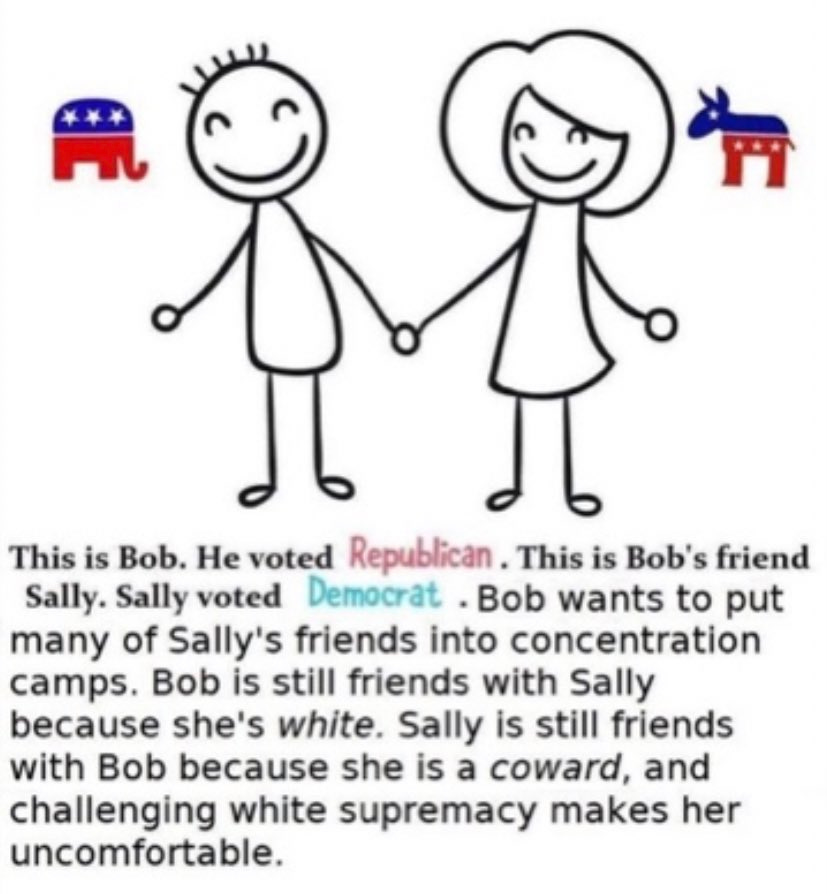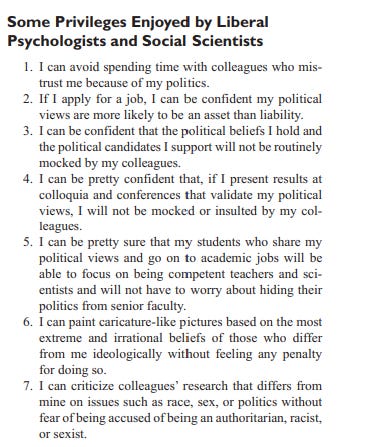We Tried to Warn You
Preliminary List of Articles that Attempted to Warn Academics and Other Scientists that their Politicization of Scholarship, Teaching, Funding, Hiring and Promotions Was a Slow-Moving Train Wreck
This thorn in my side
Is from the tree I planted
-Metallica, Bleeding Me1
We warned you. This post documents the extent to which we warned you, over and over for at least 25 30 50 100 years. At the end, it presents over 50 (update) 70 80 90 100 115+ and still counting2 references documenting the historical attempt of dissident academics to warn the rest of academia that this could come if they did not get their house in order. Now its here.
The Trump administration is crushing many of the norms of academia. Some might argue that it is crushing academia. First, it is seeking to extirpate DEI. Second, it drastically cut indirect costs on grants which fund a lot of discretionary programs in academia. Third, it has paused making decisions on funding most new grant proposals. Only the gods and Trump’s inner circle know what is coming next.
Why are they doing this? Probably lots of reasons, but some are:
Academia became a club for those on the political left, including plenty on the far left.
Many academics embraced and advanced the politicization of academia in everything from research to teaching to bureaucracy (DEI!) as if it was some sort of good thing.
People have become hyper-polarized, especially affectively polarized. That means that they hate the other side more than they actually disagree with the other side. Academics are on the left to far left, and many on the left/far left hate Republicans and especially Trump.
Trump and the Republicans know this. I do not know if they actually hate us per se, but they know most of us hate them, and they are ready, willing, and able to wage relentless political war to crush the far left activist wing of academia. And if academics scream about how dangerous and misguided some of their policies are, why should they care? Why should they bother to listen? We have completely delegitimized ourselves in the eyes of vast swaths of the country. We have set ourselves up as their hostile opponents. We have demonized them relentlessly. Half the country voted for Trump. Half. And many academics think they are racists and fascists.
A few weeks ago, I received this in an email from the Rutgers AAUP. That’s the union. It “represents” the faculty.
I think the sort of sentiment in the red circle is representative of much of academia.
Tell me again why Trump and the Republicans should care one iota about what academics think? Or why they should want to richly fund playhouses for radical activists and their enablers?
We Tried to Warn You
For decades, dissident academics had been trying to warn the rest of academia that their infusion into their professional responsibilities of left-to-radical politics, including but not restricted to “social justice,” was a slow-moving trainwreck.3
I was one of them. From my paper on the scientifically narrow and politicized nature of "diversity" in psychological science accepted by Klaus Fiedler in 2022 for publication in Perspectives on Psychological Science:
"Political battles will be fought using political tools, and not exclusively in the pages of peer reviewed journals or DEI committees. It would not be surprising to discover that cuts to government funding of social science are among the next targets in the sights of politicians who oppose the academic far left." 4
But instead of heeding the warning, they became obsessed with the "racism" of the editor who accepted it and with delusions of racist mules. And of course they did. That was 2022. The Summer of Floyd was still fresh in many people’s minds. DEI had marched through the institutions like Sherman marching through Georgia, complete with scorched earth policy. Except the scorched earth of DEI was more of a scorched lives policy: In academia, and for many outside of it, those who criticized DEI or BLM, or who simply ran afoul of social justice sacred narratives risked being mobbed, ostracized and punished, up to and including losing their livelihoods.
So of course they came after my paper. And of course, their thundering hallucinations of racism rendered them incapable of even hearing, let alone heeding, the warning.
I was doing this long before the Attack of the Racist Mule. This paper is from 2012.
That was 2012, but it was by far not the first paper to raise the warning flag. Much has been written on this before me, by academics, though the pace of such dissident warnings did start picking up around 2012. I keep saying academics, because, this means the people giving the warnings shared much of the same training and expertises as those who were warned. You might think all this scholarship could have had some impact on how academia functioned. Silly you.
They were warned. They did not hear it. They did not want to hear it. They were so full of moral self-righteousness, how could they have heard? “Oppression” hijacked every last auditory neuron.
In an alternate universe, academics took to heart the early warnings about why politicizing their scholarship, teaching, and bureaucracies was a really bad idea. People who politicized their work anyway were deemed incompetent and treated accordingly; their articles were rejected, their grants never funded. As a result, most could not get tenure track jobs. In this alternate universe, the federal govt never took any steps to depoliticize academia or defund it because there was no need. And so there was no risk of federal policy being implemented recklessly, like the proverbial bull in a china shop.
But back in our real world, things unfolded quite differently. Academics were warned, they did not listen, and now the bells are tolling for much of what they hold dear about academia. They might even be the bells not of reform, but of vengeance.
In the rest of this post, I begin documenting the extent to which they were warned by their own colleagues in academia. What appears below is a list of every academic publication that I could find5 that was available to them and which tried to warn them. Cumulatively, they should have been recognized decades ago as a small smoldering flame and stamped out. But it was not recognized. Over the years, the flame grew and grew until it became a five alarm fire. And, like a story of old, academics sat there, fiddling their righteous lies, delusions, and propaganda until it was too late.
I only recently (November, 2025) discovered that the American Association of University Professors, now an engine for progressive activism, warned in its 1915 statement on academic freedom of exactly what we are witnessing now:
If this profession should prove itself unwilling to … prevent the freedom which it claims in the name of science from being used as a shelter … for uncritical and intemperate partisanship, it is certain that the task will be performed by others—by others who lack certain essential qualifications for performing it, and whose action is sure to breed suspicions and recurrent controversies deeply injurious to the internal order and the public standing of universities.
Academics could have put out the early fires with some water. But they refused. So the people of the United States of America voted for a different fireman. And he is not just going to bring a few fire engines; he is unleashing a flood.
Derek Bok, former Harvard President, in 1990, warned of just this:
universities are not very good at passing collective judgments on political issues in the outside world. Their decisions often reflect the strong convictions of strategically placed minorities—whether they be trustees or activist groups—rather than the informed judgment of the entire community. Campus debates on such subjects also suffer from a kind of double standard. In writing papers, taking examinations, or publishing articles, students and faculty try hard to be objective, to recognize opposing arguments, to marshal evidence with care. When political issues are at stake, however, discussions quickly become partisan, demogogic, and filled with inaccuracies and exaggerations. Such debates do not produce wise conclusions, nor are they worthy of the university’s commitment to thoughtful, dispassionate analysis.
Those who urge the university to intervene in political disputes are also highly selective in their demands…
There have been intense efforts to force universities to divest in opposition to apartheid but none (at least prior to Tiananmen Square) to protest brutal repression in China, the Soviet Union, or African nations like Burundi where ruling factions have starved, suppressed, and even slaughtered thousands of innocent people. A university that merely responded to demands, therefore, could hardly proceed in a principled, even-handed manner worthy of its intellectual ideals.
Perhaps the greatest danger in exerting political pressure of this kind is the risk of sacrificing academic independence. For generations, universities have worked to persuade society that they should be free to shape their own programs and that their professors should be entitled to teach and write as they think best. This autonomy is essential to the progress of teaching and research. Yet universities can hardly claim the right to be free from external pressure if they insist on launching campaigns to force outside organizations to behave as their students and faculties think best. Sooner or later, governments, corporations and other groups will decide that sauce for the goose is sauce for the gander and begin exerting pressure of their own. When that happens, universities will learn to their dismay that they stand to lose far more than they can gain from trying to joust with the outside world. Student activists often argue that this danger is only hypothetical and that the university should ignore the risk until retaliation actually occurs. By that time, however, it may be too late, and generations of effort to secure autonomy will have been placed in jeopardy.
Preliminary List of Articles that Attempted to Warn Academics and Other Scientists that their Politicization of Scholarship, Teaching, Funding, Hiring and Promotions Was Scientifically Unjustified, Morally Corrupt, Pragmatically Harmful and/or Likely to Produce a Political Backlash
This list is preliminary. It is a work in progress. I plan to periodically update it. To get on the list, the source has to either explicitly warned academia about the damage it was doing by embracing leftwing political activism in its scholarship, teaching, funding, and bureaucracies, or to have highlighted harms to individuals or to science, social science, other scholarship and teaching that resulted from that political activism.
The list does not include sources that are generically critical of the left, progressives, “wokeism” and the like. The issue here is not left vs. right, per se (there are ample epistemic dysfunctions on the left and right — see our book, linked below, The Poisoning of the American Mind). The problems occur when people enthusiastically embraced, rather than earnestly attempted to limit, infusing personal politics into their academic work. And because the professoriate and administration in academia is so overwhelmingly skewed to the left (90% or more by some counts, see many of the references below), that infusion came almost exclusively from the left.
This figure summarizes much of the work in the now nearly 100 sources listed below. Each spoke of the wheel is is one type of manifestation of the politicization of academia. It is an expansion of a model that first appeared in Honeycutt & Jussim (2020), which is listed and linked below.

Books
Note: Edited books are listed here only if many chapters in them addressed the problem of academic politicization and political bias from different angles. Some of the chapters are also listed separately.
Crawford, J. T., & Jussim, L. J. (Eds.). (2017). The politics of social psychology. Psychology Press.
Dreger, A. (2016). Galileo's middle finger: Heretics, activists, and one scholar's search for justice. Penguin books.
Eppard, L. M., Mackey, J. L., & Jussim, L. (Eds.). (2024). The Poisoning of the American Mind. University of Virginia Press.
Frisby, C. L., Redding, R. E., & O’Donohue, W. T. (Eds.) (2023). Ideological and Political Bias in Psychology: Nature, Scope, and Solutions (pp. 1-14). Cham: Springer International Publishing.
Huemer, M. (2024). Progressive Myths. Michael Huemer.
Lukianoff, G., & Haidt, J. (2019). The coddling of the American mind: How good intentions and bad ideas are setting up a generation for failure. Penguin.
Maranto, R., Redding, R. E., & Hess, F. M. (Eds.). (2009). The politically correct university: Problems, scope, and reforms. Rowman & Littlefield.
Pinker, S. (2003). The blank slate: The modern denial of human nature. Penguin.
Pluckrose, H., & Lindsay, J. A. (2020). Cynical theories: How activist scholarship made everything about race, gender, and identity—and why this harms everybody. Pitchstone Publishing (US&CA).
Smith, C. (2014). The sacred project of American sociology. Oxford University Press.
Weiss, E. (2024). On the warpath: My battle with Indians, pretendians, and woke warriors. Academica Press.
Yancey, G. (2017) Compromising Scholarship: Religious and Political Bias in American Higher Education. Baylor University Press: Waco, TX.
Journal Articles and Book Chapters
Abbot, D., Bikfalvi, A., Bleske-Rechek, A. L., Bodmer, W., Boghossian, P., Carvalho, C. M., ... & West, J. D. (2023). In defense of merit in science. Journal of Controversial Ideas, 3(1).
Abramowitz, S. I., Gomes, B. & Abramowitz, C. V. (1975) Publish or politic: Referee bias in manuscript review. )Journal of Applied Social Psychology 5(3):187–200. doi:10.1111/j.1559-1816.1975.tb00675.x
Al Gharbi, M. (2018). Race and the race for the White House: On social research in the age of Trump. The American Sociologist, 49, 496-519.
Bailey, J. M. (2019). How to ruin sex research. Archives of Sexual Behavior, 48(4), 1007-1011.
Barth, R. P., Garcia, A. R., Jonson-Reid, M., & Drake, B. (2025). Strengthening social work research education in pursuit of social justice. Research on Social Work Practice, 35(1), 11-14.
Bartels, J. M. (2023). Indoctrination in introduction to psychology. Psychology Learning & Teaching, 22(3), 226-236.
Clark, C. J., Jussim, L., Frey, K., Stevens, S. T., Al-Gharbi, M., Aquino, K., ... & von Hippel, W. (2023). Prosocial motives underlie scientific censorship by scientists: A perspective and research agenda. Proceedings of the National Academy of Sciences, 120(48), e2301642120.
Clark, C. J., & Winegard, B. M. (2020). Tribalism in war and peace: The nature and evolution of ideological epistemology and its significance for modern social science. Psychological Inquiry, 31(1), 1-22.
Davison, A. (2020). A Darwinian Approach to Postmodern Critical Theory: Or, How Did Bad Ideas Colonise the Academy?. Society, 57(4), 417-424.
Duarte, J. L., Crawford, J. T., Stern, C., Haidt, J., Jussim, L., & Tetlock, P. E. (2015). Political diversity will improve social psychological science. Behavioral and Brain Sciences, 38, e130.
Eagly, A. H. (1995) The science and politics of comparing women and men. American Psychologist 50:145–58.
Eitan, O., Viganola, D., Inbar, Y., Dreber, A., Johannesson, M., Pfeiffer, T., ... & Uhlmann, E. L. (2018). Is research in social psychology politically biased? Systematic empirical tests and a forecasting survey to address the controversy. Journal of Experimental Social Psychology, 79, 188-199.
Efimov, I. R., Flier, J. S., George, R. P., Krylov, A. I., Maroja, L. S., Schaletzky, J., Tanzman, J., & Thompson, A. (2024). Politicizing science funding undermines public trust in science, academic freedom, and the unbiased generation of knowledge. Frontiers in Research Metrics and Analytics, 9, 1418065.
https://www.frontiersin.org/journals/research-metrics-and-analytics/articles/10.3389/frma.2024.1418065
Feldman, R. A. (2025). Response to the Respondents: The NIMH Task Force Report on Social Work Research. Research on Social Work Practice, 35(1), 40-43.
Fenton, J. (2022). Enlighten me: Teaching social justice in further and higher education by reclaiming philosophically liberal values–a social work education case study. Journal of Further and Higher Education, 46(8), 1066-1077.
Finseraas, H., Midtbøen, A. H., & Thorbjørnsrud, K. (2022). Ideological biases in research evaluations? The case of research on majority–minority relations. Scandinavian Political Studies, 45(3), 370-381.
Gambrill, E. (2025). Research Challenges: Unmentionables? Research on Social Work Practice, 35(1), 28-31.
Guterman, N. B. (2025). Still further challenges to advancing social work research: Response to Feldman. Research on Social Work Practice, 35(1), 21-23.
Hilton, E. and Wright, C., 2023. Two sexes. In Sex and Gender (pp. 16-34). Routledge.
Hodge, D. R., & Drake, B. (2025). The End of Quantitative Research in Social Work? The Threat Posed by Postmodern/Critical Theory's Increasing Colonization of Academia. Research on Social Work Practice, 35(2), 121-128.
Honeycutt, N., & Jussim, L. (2020). A model of political bias in social science research. Psychological Inquiry, 31(1), 73-85.
Honeycutt, N., & Jussim, L. (2023). Political Bias in the Social Sciences: A Critical, Theoretical, and Empirical Review. In C. L. Frisby, R. E. Redding, W. T. O’Donohue, & S. O. Lilienfeld (Eds.), Ideological and Political Bias in Psychology: Nature, Scope, and Solutions (pp. 97–146). Springer International Publishing. https://doi.org/10.1007/978-3-031-29148-7_5
Hooven, C. K. (2023). Academic freedom is social justice: Sex, gender, and cancel culture on campus. Archives of Sexual Behavior, 52(1), 35-41.
Inbar, Y., & Lammers, J. (2012). Political diversity in social and personality psychology. Perspectives on Psychological Science, 7(5), 496-503.
Joshi, H. (2022). The epistemic significance of social pressure. Canadian Journal of Philosophy, 52(4), 396-410.
Jussim, L. (2012). Liberal privilege in academic psychology and the social sciences: Commentary on Inbar & Lammers (2012). Perspectives on Psychological Science, 7(5), 504-507.
Jussim, L. (2024). Diversity is diverse: Social justice reparations and science. Perspectives on Psychological Science 19, no. 3: 564-575.
Jussim, L., Crawford, J. T., Anglin, S. M., & Stevens, S. T. (2014). The politics of social psychological science II: Distortions in the social psychology of liberalism and conservatism. In J. Forgas (editor), Sydney Symposium on Social Psychology and Politics.
Jussim, L., Crawford, J. T., Stevens, S. T., & Anglin, S. M. (2016). The politics of social psychological science: Distortions in the social psychology of intergroup relations. J. Forgas (editor), Social psychology of political polarization, 165-196.
Jussim, L., Crawford, J. T., Stevens, S. T., Anglin, S. M., & Duarte, J. L. (2016). Can high moral purposes undermine scientific integrity? In J. Forgas (editor), The social psychology of morality (pp. 173-195). Routledge.
Jussim, L., Finkelstein, D., & Stevens, S. T. (2023). Uncertainty, Academic Radicalization, and the Erosion of Social Science Credibility. In J. Forgas (editor), The Psychology of Insecurity (pp. 329-348). Routledge.
Jussim, L., & Honeycutt, N. (2023). Psychology as science and as propaganda. Psychology Learning & Teaching, 22(3), 237-244.
Jussim, L., Honeycutt, N., Careem, A., Bork, N., Finkelstein, D., Yanovsky, S., & Finkelstein, J. (2023). The new book burners: Academic tribalism. In J. Forgas (editor), The Tribal Mind and the Psychology of Collectivism (pp. 227-246). Routledge.
Jussim, L., Honeycutt, N., Paresky, P., Careem, A., Finkelstein, D., & Finkelstein, J. (2023). The radicalization of the American academy. In J.P. Zuquete (editor), The Palgrave Handbook of Left-Wing Extremism, Volume 2, 343-366.
Krylov, A. I. (2021). The peril of politicizing science. The Journal of Physical Chemistry Letters, 12(22), 5371-5376.
A.I. Krylov and J. Tanzman (in press). Fighting the good fight in an age of unreason—a new dissident guide. In The Free Inquiry Papers book edited by Robert Maranto, Lee Jussim, and Sally Satel, and published by AEI.
Krylov, A.I., Frenking, G., Gill, P.M.W. (2022). Royal Society of Chemistry provides guidelines for censorship to its editors. Chemistry International 44, 32 – 34. Abstract Full text
Krylov, A.I. and Tanzman, J. (2023). Critical Social Justice subverts scientific publishing. European Review 31, 527 – 546.
Krylov, A. I., Tanzman, J. S., Frenking, G. & Gill, P.M.W. (2022). Scientists must resist cancel culture. Nachrichten aus der Chemie 70, 12 – 14.
Lupia, A. (2023). Political endorsements can affect scientific credibility. Nature, 590-591.
Martin, C. C. (2016). How ideology has hindered sociological insight. The American Sociologist, 47, 115-130.
McNally, R. J. (2024). Is Clinical Psychological Science Infected by Racism and White Supremacy? Journal of Controversial Ideas, 4(2).
Mizruchi, M. S. (2017). The current crisis of American sociology. Michigan Sociological Review, 31, 1–26.
Paresky, P., & Campbell, B. (2023). Psychology’s language and free speech problem. In C. L. Frisby, R. E. Redding, W. T. O'Donohue, & S. O. Lilienfeld (Eds.), Ideological and political bias in psychology: Nature, scope, and solutions (pp. 149–172). Springer Nature Switzerland AG. https://doi.org/10.1007/978-3-031-29148-7_6
Peters, U., Honeycutt, N., De Block, A., & Jussim, L. (2020). Ideological diversity, hostility, and discrimination in philosophy. Philosophical Psychology, 33(4), 511–548. https://doi.org/10.1080/09515089.2020.1743257
Redding, R. E. (2001). Sociopolitical diversity in psychology: The case for pluralism. American Psychologist, 56(3), 205.
Redding, R. E. (2013). Politicized science. Society, 50, 439-446.
Rothman, S., Lichter, S. R., & Nevitte, N. (2005, March). Politics and professional advancement among college faculty. In The Forum (Vol. 3, No. 1, p. 0000102202154088841067). De Gruyter.
Sarewitz, D. (2013). Science must be seen to bridge the political divide. Nature 493, 7 . https://doi.org/10.1038/493007a.
Sarewitz, D.(2014). Science should keep out of partisan politics. Nature 516, 9. https://doi.org/10.1038/516009a
Savolainen, J. (2024). Unequal treatment under the flaw: Race, crime & retractions. Current Psychology, 43(17), 16002-16014.
Sokal, A. D. (1996). Transgressing the boundaries: Toward a transformative hermeneutics of quantum gravity. Social Text, (46/47), 217-252.
Specht, H. (1986). The Deprofessionalization of Social Work. Korean Journal of Social Welfare, 8, 195-207.
Stevens, S. T., Jussim, L., & Honeycutt, N. (2020). Scholarship suppression: Theoretical perspectives and emerging trends. Societies, 10(4), 82.
Suissa, J., & Sullivan, A. (2021). The gender wars, academic freedom and education. Journal of Philosophy of Education, 55(1), 55-82.
Tetlock, P. E. (1994). Political psychology or politicized psychology: Is the road to scientific hell paved with good moral intentions?. Political Psychology, 509-529.
Walsh, A. (2022). Ideology and Intolerance: The Case of Colonialism. Journal of Ideology, 41(1), 5.
Whittington, K. (2018). Ideological ostracism and viewpoint diversity on campus. Concluding chapter in Speak freely: Why universities must defend free speech. Princeton University Press.
Zigerell, L. J. (2019). Left unchecked: Political hegemony in political science and the flaws it can cause. PS: Political Science & Politics, 52(4), 720-723.
Zigerell, L. J. (2018). Black and White discrimination in the United States: Evidence from an archive of survey experiment studies. Research & Politics, 5(1), 2053168017753862.
Essays, Op-Eds, and Blogs
Bikfalvi A, Ideology-Based Investigations, Myths, and Blind Spots in Academia and Society NOV 17, 2024
Bikfalvi A. The Open Society and its Enemies 2.0. APR 28, 2024https://hxstem.substack.com/p/the-open-society-and-its-enemies
Bikfalvi A., Kuntz M. (2020). International Scholars Must Resist the American Campaign to Inject Racial Tribalism Into Science. Quillette.
Bloom, P. (2024). Progressives should worry more about their favorite scientific findings. Substack.
Bork, N., Maranto, R. & Bradley-Dorsey, M. (2024). Preventing the Next Wave of Progressive Radicalism---Before It Arrives. Quillette.
Burgess, M. (2024). It’s time to stop the double talk around diversity hiring. Chronicle of Higher Education.
Burgess, M., Pielke Jr., R. (2023). Partisan science is bad for science and society. Heterodox Academy.
Coyne JA, Krylov AI, The ‘Hurtful’ Idea of Scientific Merit, The Wall Street Journal.
Etchemendy, J. (2017). The threat from within. Stanford Report. (Note: John Etchemendy was Provost at Stanford).
George, R. & Krylov, A. The Ruthless Politicization of Science Funding, The Chronicle of Higher Education.
Haidt, J. (2011). The bright future of post-partisan psychology. The Edge.
Haidt, J., & Jussim, L. (2016). Psychological science and viewpoint diversity. APS Observer, 29.
Jussim, L. (2018). The reality of the Rise of a Radical and Intolerant Left on Campus. Areomagazine.
Krylov AI and Tanzman J. (2021). Academic ideologues are corrupting STEM. The silent liberal majority must fight back. Quillette. Abstract Full text
Krylov AI (2022). From Russia with Love: Science and Ideology Then and Now, HxSTEM.
Lutz, M. (2023). The hand that feeds. Humean Being Substack.
Maranto, R. (2024). Saving American Political Science and Saving America: Reflections and Recommendations to Restore Pluralism | American Enterprise Institute - AEI, March 25.
James Meigs (2021). How Alan Sokal Won the Battle but Lost the ‘Science Wars.’ Commentary Online.
Paresky, P. (2015). How Making Colleges 'Safe Spaces' Makes Us All Less Safe. Psychology Today.
Paresky, P. (2017). The Savage Empathy of Safe Spaces. Psychology Today.
Paresky, P. (2022). Diversity, Equity, and Inclusion: Commitment or Cult? Psychology Today.
Paresky, P. (2022). A Bad Sign for the Future of Higher Education. Psychology Today.
Paresky, P. (2023). The Credibility Crisis in Psychology: A Tragedy in Four Act. Substack.
Paresky, P. (2023). Yoel Inbar and the Credibility Crisis in Psychology. Psychology Today.
Pluckrose, Lindsay, Boghossian. (2017). Academic Grievance Studies and the Corruption of Scholarship. Areomagazine.
Pluckrose and Lindsay. (2020). Why Scholar-Activists made everything about identity and why this goes so badly wrong. Minding the Campus.
Jukka Savolainen (2022): And yet it moves: A top scientific journal places political correctness above the search for truth. City Journal (reprinted in the NY Post).
Jukka Savolainen (2022): How the academic establishment won the debate by ignoring the challenge. Heterodox Academy Blog.
Jukka Savolainen (2023): Florida’s shunning of sociology should be a wake-up call – The field has morphed from scientific study into academic advocacy for left-wing causes. Wall Street Journal
Jukka Savolainen (2023): If the findings detract, you must retract. How dissent is policed in social science. Quillette (June 18).
Sokal, A. (2024). How ideology threatens to corrupt science. The Critic.
Sokal, A. (2024). Woke invades the sciences. The Critic.
Stanovich, K. (2021). The Social Science Monoculture Doubles Down. Quillette.
Thompson, A. (2019). A word from… (editorial in Notices of the American Mathematical Society). (this is one of the earliest critiques of DEI statements from within academia. On cue, Thompson was mobbed and denounced for it).
Thompson, A. (2019). The University’s New Loyalty Oath. Wall Street Journal.
Wallsten, K. 2024. “Higher Ed’s Worsening Crisis of Confidence.” Real Clear Education.
Wallsten, K. 2023. “Is DEI Causing the Crisis of Free Speech on Campus?” Heterodox Academy.
Wallsten, K. 2024. "The Political Causes of the College Enrollment Crisis."
Wright, C.M. and Hilton, E.N., 2020. The dangerous denial of sex. Wall Street Journal, 13.
Other
Bok, D. The President’s Report 1989-1990 Harvard University.
Honeycutt, N. (2022). Manifestations of political bias in the academy. Dissertation, Rutgers University. https://doi.org/10.7282/t3-2y4z-7009
Honeycutt, N. (2024). The Politics of University Faculty. Preprint. https://doi.org/10.31234/osf.io/dnxqh
Honeycutt, N. (2024). Faculty Evaluations of DEI Statements for Academic Hiring. Preprint. https://doi.org/10.31234/osf.io/mwt5r (manuscript under review)
Honeycutt, N., & Jussim, L. (2022). On the connection between bias and censorship in academia. https://psyarxiv.com/4f9va/ (likely forthcoming as a chapter in an edited volume).
Kaufmann, E. (2021). Academic freedom in crisis: Punishment, political discrimination, and self-censorship. Center for the Study of Partisanship and Ideology, 2, 1-195.
Commenting
Before commenting, please review my commenting guidelines. They will prevent your comments from being deleted. Here are the core ideas:
Don’t attack or insult the author or other commenters.
Stay relevant to the post.
Keep it short.
Do not dominate a comment thread.
Do not mindread, its a loser’s game.
Don’t tell me how to run Unsafe Science or what to post. (Guest essays are welcome and inquiries about doing one should be submitted by email).
Special Commenting Request
If you know of anything that you think should be added, please do so in the comments. I may or may not agree, but if I do agree, I’ll add it. Thanks in advance.
But only things directly taking academia to task. To keep it tractable, I do not want general criticisms of leftish ideas, even if they are all over academia, UNLESS there is a direct tie to academic dysfunction.
If you have more than one, please contact me. There is a google spreadsheet tracking all this stuff that is foundation for the list in this post. I will give you the link and you can add stuff yourself.
Update 2/15. No more blogs or op eds. There are already quite a lot and academics generally do not take them seriously. Yes, I still hold out a glimmer of hope that a movement to reform academia will someday take hold from within. Maybe not today, or tomorrow, or anytime soon. But someday. For that purpose, books, articles, and scholarly-type chapters carry more weight.
Footnotes
Thorn in my side. I thank Toviah Moldwin who provided the Metallica quote that leads off this essay.
Count of articles. I thank commenters here, several folks I contacted via email, including the entire set of SOIBS founders, and folks on X for identifying additional articles. I plan to keep adding articles, as relevant, as they come in.
Slow moving trainwreck. It did not help that they were charging exhorbitant prices for driving a rickety train on tracks that had been maintained poorly. The tracks were coming apart at the bolts and the train had malfunctioning brakes. This lent credibility to “waste and fraud” charges that are much of the rhetoric of Trump and DOGE. See Ioannidis’s famous article about biomed research, Why Most Published Findings are False. See my recentish Unsafe Science post, ~75% of Psychology Claims are False:
Political battles. I wish I hadn’t nailed it so precisely.
Every article that I could find. People started flooding my email inbox and X dms with stuff to add. I will keep adding traditional scholarly material by academics — books, peer reviewed articles, and scholarly chapters. However, I had to stop posting blogs, essays and op-eds because it became too much for me to handle and also because I think they carry less weight in at least some circles. So “every article I could find” is true for the scholarly materials; it is not quite true with respect to blogs/essays/op-eds.










The Ohio Senate just passed a bill cracking down on, among other things, DEI in state schools. Protesters marched and chanted; some were dressed very like witches, others caused disruptions in the chamber following the senate's passage of the bill, while others held candles as if they were holding a vigil as higher education in Ohio died. I haven't read the full language of the bill. It may be that it's a heavy-handed overreaction. Some parts might be long-overdue. Others might be an ill-advised overreaction or based on somewhat unrelated GOP agenda items.
But it's difficult for me not to feel a sense of relief and like some progress is finally being made in rolling back the gross discrimination, inequity, and exclusion of DEI run amok in higher education. I am an Ohio State alum and remember well the focus on academic freedom and respectful, but open, challenging discourse and the pursuit of truth, as the entire foundation of the endeavor in which we were all participating. I graduated a little over twenty years ago and the priorities now in place have rendered the institution unrecognizable.
Two years ago, a professor in a department within the College of Humanities told me directly how their (singular - i'm disguising the gender) department went about hiring three new professors. It was entirely clear to all involved that all three people hired would be black. This professor told me that they considered one candidate, a white woman, by far the most impressive. She had no chance. They told me that the first candidate chosen was very impressive and would likely have made any short list. The second candidate chosen was qualified, but wholly unremarkable, and would not, in this professor's opinion, have been seriously considered had it not been for the threshold racial requirement. They told me the third person chosen was far, far down the list of candidates and stood out as clearly much less impressive than even the second candidate chosen.
They, a mainstream Democrat, told me they found the whole process and its results "cringy and gross". But everyone knew what the results would be in advance, and, who was actually going to risk alienating colleagues, administrators, DEI functionaries, and sabotaging their own career prospects by standing up for principle? So, no one rocked the boat. Now the GOP supermajority in the state legislature has gotten involved and it's difficult to feel sorry for academics and administrators who were delighted to push a regime of gross racial discrimination in a state (and land grant) institution meant to benefit all of us.
How many academic journals do we have in the social sciences? Let's guess ten thousand. How shocking that Abbot et al have to publish "In defense of merit in science" in a Journal of Controversial Ideas. Such a journal should not need to exist; we should have 10,000 journals of controversial ideas.